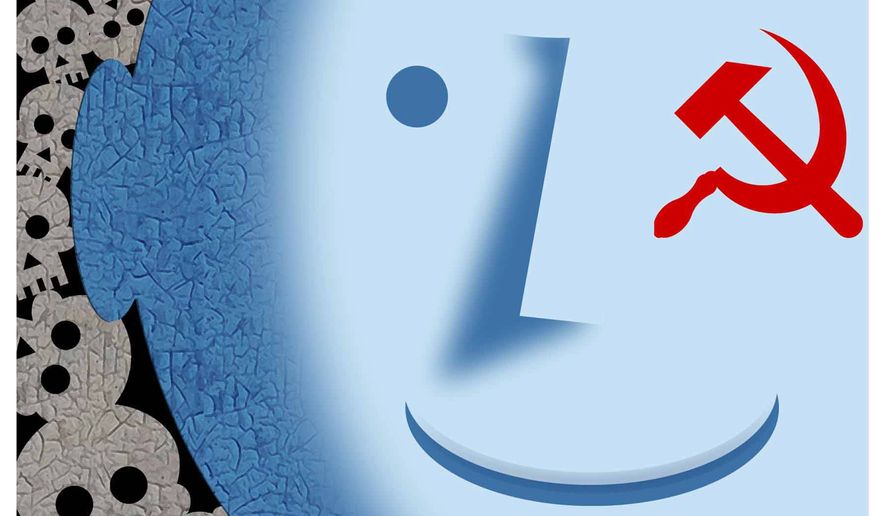OPINION:
This month, 31-year-old Arizona state representative Daniel Hernandez (D-Tucson) mocked the notion that communist ideology was a threat to American society. He remarked in a jocular tone: “We keep hearing about the threat of communism,” that it’s a “great threat, it is such a bad threat. You know what’s a bigger threat? White nationalism.”
Mr. Hernandez’s comments drew the ire of state representative Quang Nguyen (R-Prescott Valley), who, at 12-years-old, left Tan Son Nhut airport in Vietnam a week before the fall of Saigon.
Mr. Nguyen responded to his Democratic colleague’s comments by recounting his own experience as a refugee: “So let me tell you something about white nationalism. White nationalism didn’t drown 250,000 Vietnamese in the South China Sea. The communists did. White nationalism did not execute 86,000 South Vietnamese at the fall of Saigon. Communists did. White nationalism did not put me here. Communism did. So, don’t take it lightly. Don’t mock me. Don’t mock what I go through in life. It’s rough. I lost most of my cousins, my family members due to communism. If we don’t stand up to teach communism to our children, we’ll lose this country. So sir, don’t mock me.”
As the memories of the Cold War fade, communism has slowly lost its negative connotation, particularly among more young Americans. A YouGov poll taken in 2019 found that more than a third of American millennials now approve of communism1.
The atrocities committed by communist regimes traditionally would be captured and codified in academic material. Yet, the poll results suggest otherwise. Clearly, something has gone awry in the teaching of recent history.
Arizona’s House of Representatives recently passed a provision for civics studies to include “a comparative discussion of political ideologies that conflict with the principles of freedom and democracy essential to the founding principles of the United States” as part of the state budget.
Historian Max Hastings has argued that the evils of Nazism are well known and understood due to widespread exposure to photographic evidence of the atrocities committed by Hitler’s regime. Comparatively, communist dictators such as Stalin and Mao Zedong were largely successful in obscuring evidence of their atrocities.
We must educate our nation’s youth about the failures and cruelties committed in history by communist regimes – so they are not consigned to repeat the past mistakes.
The brutality of communist North Vietnam had arguably been known since 1954 when Ho Chi Minh’s land reform policies resulted in tens of thousands of Vietnamese deaths. French historian Jean-Louis Margolin is quoted Ho Chi Minh’s communists’ motto: “Better ten innocent deaths than one enemy survivor.”
The communist regime was more organized and unified than the anti-communist Republic of Vietnam in the south. Any chance for unity in the south was lost by its leader Ngo Dinh Diem, whose government favored an elite Catholic minority over its majorly Buddhist population. Following a period of repression of South Vietnamese Buddhists known as the Buddhist crisis, Mr. Diem lost domestic and international support.
After the 1963 coup deposing Mr. Diem, subsequent leaders could not consolidate a highly divided country, and the North and South plunged deeper into war. After the Fall of Saigon on April 30, 1975, the communists sought to punish the South Vietnamese through the killings that Rep. Nguyen spoke of on the Arizona House floor.
Roughly 300,000 Vietnamese were imprisoned and tortured in “re-education” camps. In the eighteen months after the fall of Saigon, it is estimated that between 100,000 to 250,000 people were executed, and more than 2 million residents in the region were imprisoned. 250,000 Vietnamese refugees, referred to in the U.S. media as “boat people,” drowned in their attempt to escape the brutality of the communist regime. Many Vietnamese fled to the United States in search of freedom from oppression.
Both Mr. Diem and the Communist regime viewed fellow citizens as disposable because of their religious or political affiliations. The First Amendment to the U.S. Constitution assured the Vietnamese refugees that there would be none of that. The dehumanization of one’s fellow human being on account of differences is a hallmark of communist and certain anti-communist dictatorships.
Learning about the negative effects of the totalitarian doctrines practiced by communist regimes in history will come to be vital to preparing young generations in an ever-polarized country and world. It’s one history lesson that could save the future of America.
• Robert T. Wood is a researcher, writer, educator, and analyst. He is a graduate of the College of William and Mary with two Bachelor of Arts degrees in Global Studies and Hispanic Studies and a Master of Arts in Latin American Studies from Georgetown University.




Please read our comment policy before commenting.